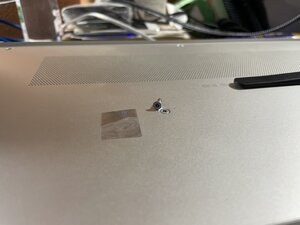I have done this on the EliteBooks where someone overtightened it: I use the largest bit that (safely!) fits the screw in its current state. When I had to do this on my used but new to me HP 640 G9, it was because the seller or prior owner cranked on it so horribly tight the screw was damaged but there was enough left to go in with a Phillips #1 bit and get it out for replacement. Try multiple sizes until you find the right one given your situation —YMWV.
The real trick is to use something like a big screwdriver which takes 1/4" bits, and using the "right bit" to get it done for the excess torque you will need. I use the Manta driver kit or the Mahi driver kit (both work as they use the same driver handle) so I can get these screws out as needed when this happens.
Think about it this way: You are using a disproportionally large screwdriver to "break" the screw out cleanly, and being able to replace it if needed as the head remains intact (or ignore it if it’s not critical or structura)l. The exception here is structural screws and bottom covers: if it's for a bottom cover where the main cover is the structure I will either be very careful moving forward to not make it worse, or if say I run into a non damaged screw from a LD unit I will take the good screw from that machine and then replace it. That isn't always possible (especially on the Lat D RAM door) given it's often captive with a C clip, so you usually need a new door, but it isn't hard to find a replacement.
This is how well that technique works:
crwdns2934105:0crwdne2934105:0
crwdns2934113:0crwdne2934113:0
crwdns2915270:0crwdne2915270:0
crwdns2889612:0crwdne2889612:0
1

 1
1 
 282
282  154
154 


